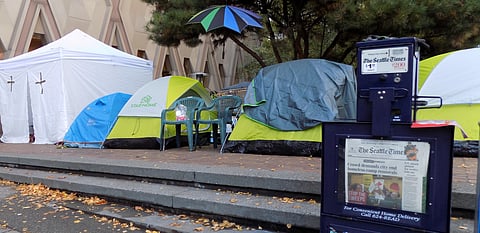Stop the Sweeps Seattle Continues Outdoor Occupation after City Hall Protest
by Will Sweger
Last Thursday night, huddled under the entryway of the King County Administration Building against the cold rain, approximately twenty Seattleites gathered to discuss their options. The encampment of about 30 tents they had been calling home was facing eviction the next morning. This site was all that was left of Wednesday's demonstration to occupy city hall.
With the temperature dropping, tempers flared. Someone suggested moving the encampment to a new home in the University District, but one camper openly worried he would face violence from the area's "drunken frat boys." For a moment, the talks stalled as new arrivals emerged from the dark street, and camp members broke off to offer them pizza and lodging among the soggy tents.
Earlier that day, the campers had packed up their belongings and moved a block from the occupy site at city hall. Now, bundled against the damp cold, they discussed other locations around the city where they might avoid another eviction by city or county officials.
Outside city hall, Andy Ribaudo, an organizer for the occupy event, stood with a list of altenative encampment sites around the city. As the map he held soaked up drops of water falling from the sky, his patience also wore thin. Ribaudo is an army veteran who now works aiding unsheltered Seattleites. His experience with the city's homeless crisis and its institutions has left him furious.
According to a 2017 count, 3,857 people in Seattle and 5,485 in King County as a whole remain unsheltered. Some 4,665 Seattleites are currently housed in shelters. Nationally, Seattle trails only New York and Los Angeles for the highest number of people experiencing homelessness.
Two years after Mayor Ed Murray declared a state of emergency over homelessness in Seattle, the recent election has spurred further debate over not only how much Seattle will continue to spend addressing the crisis, but also how effective the city's approaches have been. Interim Mayor Tim Burgess has defended city-run sweeps of homeless encampments while activists and several city councilmembers have called for an approach focusing on housing for all.
Ribaudo sits, unshaven, in an oversized green army parka and issue cap, waiting to hear the decision of the unhoused members of the camp. His first inclination was to stay at city hall, but he reluctantly bowed to a vote by the campers to leave after Councilmember Sawant's negotiated extension ended.
Frustrated by what he saw as a lack of action from Socialist Alternative, he left the organization, abandoning his liberal democratic leanings and embracing anarchism. He began looking at the homeless problem in military terms, and invoked the military's sense of camaraderie—of not leaving a comrade behind. He also focuses on the strategy of socialized healthcare, food, and housing in the military and wonders why we have not created a similar support system for our civilian workforce. "Being job-ready includes shelter," he said. "Just by putting people in housing you can push through a lot of the material conditions that hold people from thriving."
Ribaudo is tired, strung out, a man living on the edge. In his exhaustion, he has fallen back into the logic of a military organization. The depot for donated supplies became a "headquarters." His tactics embracing step-by-step escalation with the police have raised concern among his supporters in the camp. For him, sitting on a wall with a megaphone in front of an encampment talking to passing pedestrians about stopping the sweeps is a perfectly reasonable action to take.
He explained the short term goal of the activist group Stop the Sweeps Seattle is to put the goods and resources donated recently into the hands of the people on the street who need them most, essentially keeping unhoused neighbors alive.
In the morning, as the group worked together to take down tents and load supplies into vehicles, King County administration employees began arriving. The mix of suited office workers passing through a crowd of people who had slept outside overnight provoked many uncertain glances. For someone living on the street, the feeling of wary eyes following you around becomes an unwelcome companion. Inside the foyer, guards reassured concerned office workers, "they're breaking down slowly, but surely."
As the groups set off Friday morning for their new encampments, still uncertain what they would find, the first snowflakes of the season began falling from the sky.
Will Sweger is a Beacon Hill resident and contributor at the South Seattle Emerald. His work has appeared in Seattle Weekly, Curbed Seattle and Borgen Magazine. Find him on Twitter @willsweger
Help keep BIPOC-led, community-powered journalism free — become a Rainmaker today.


